
What Causes Scoliosis in Adults?
Adult scoliosis is something you may have not thought of until you’ve encountered it yourself or someone close to you has been diagnosed with it as well. Scoliosis is when there’s an abnormal curvature of the spine, often associated with adolescence. For this reason, it’s rarer to see adults develop or experience scoliosis if they were never diagnosed as a child. Understanding the potential causes of adult scoliosis is important, as you may be reading this post if you believe you have adult scoliosis. Read on to learn more about what causes adult scoliosis and how we at Neurosurgery & Spine Consultants may be able to help you overcome this condition with the help of our team of medical experts.
Types of Adult Scoliosis
Adult scoliosis typically falls into two categories:
Idiopathic Scoliosis
This form of adult scoliosis originates during adolescent years, yet it progresses into its full stage during adulthood. It may remain undetected for many years, until another doctor has a chance to properly diagnose the condition. Age-related changes can make the condition worse, as the natural aging process may exacerbate the curvature of the spine, resulting in an increased level of noticeable symptoms.
Degenerative Scoliosis (De Novo Scoliosis)
Degenerative scoliosis develops in adulthood, typically as a result of aging and spinal degradation. This type of adult scoliosis typically appears after the age of 50. It’s most commonly linked to wear and tear on the spine.
Key Causes of Scoliosis in Adults
Degenerative Changes
Degenerative changes of the spine can be the result of natural wear and tear, injuries, arthritis, and more. These changes may weaken the spine’s structural integrity over time, leading to a curvature of the spine.
Osteoporosis
Osteoporosis, a condition which weakens the bones, may lead to vertebral fractures. The vertebral fractures may cause the spine to collapse unevenly, which could in turn lead to the development of adult scoliosis.
Trauma or Injury
Trauma or injury, such as a fracture or underlying damage from some type of accident, may alter the alignment of the spine, possibly leading to scoliosis.
Neuromuscular Conditions
Neuromuscular conditions such as muscular dystrophy, cerebral palsy, or spinal cord injuries may impact the level of muscle control and overall spinal stability. This in turn could lead to a case of adult scoliosis.
Post-Surgical Changes
If there have been previous surgeries which have taken place, these surgeries may lead to an imbalance or complication which could result in the development of adult scoliosis over time.
Genetic Factors
A family history of scoliosis may increase the risk of developing the condition in adulthood, if you haven’ t already developed it in childhood. Genetics will often play a role in this development of adult scoliosis.
Poor Posture & Lifestyle Factors
Poor posture and lifestyle factors are not a direct cause of adult scoliosis, yet they can be a potential contributor to scoliosis progression in adults.
Symptoms to Look For
Adult scoliosis symptoms may vary, but common indicators include:
• Persistent back pain or stiffness
• Uneven shoulders, waist, or hips
• Difficulty standing upright
• Numbness or weakness in the legs, often due to nerve compression
• Fatigue after standing or walking for long periods
Diagnosis & Treatment
If adult scoliosis is suspected, there are a few different options which can be acted on. Your healthcare provider will conduct a thorough examination to determine if there are any underlying causes of your adult scoliosis. This includes everything from x-rays, to MRIs, to mobility tests, and more. Treatment options will often depend on the severity of the curvature and associated symptoms. Below are some of the most common treatment options for adult scoliosis.
Non-Surgical Treatments
Physical therapy, bracing, and pain management treatments are a few of the non-surgical treatment options available to adults with scoliosis. Anti-inflammatory medications or epidural injections may be recommended for mild to moderate cases.
Surgical Intervention
Surgical intervention is a last resort option, but it could be the right choice for your adult scoliosis condition. If there is a significant level of nerve compression from the adult scoliosis, it may require a spinal fusion or other corrective surgery to stabilize the spine and relieve symptoms.
Choose Neurosurgery & Spine Consultants for Help Managing Adult Scoliosis
Managing adult scoliosis can be difficult at times, but with the help of our dedicated team of in-house specialists who are ready, willing, and able to help you overcome this condition, you can rest assured you’re at the right place when you book your first appointment with Neurosurgery & Spine Consultants. We look forward to hearing from you soon and we’re eager to begin treating your adult scoliosis with the best treatment options for your unique condition.
DISCLAIMER: No content on this site, regardless of date, should ever be used as a substitute for direct medical advice from your doctor or other qualified clinician.